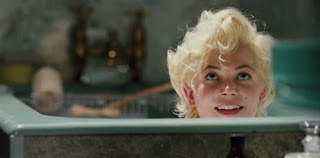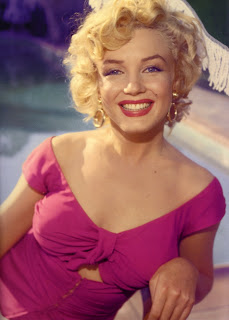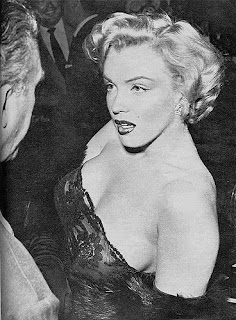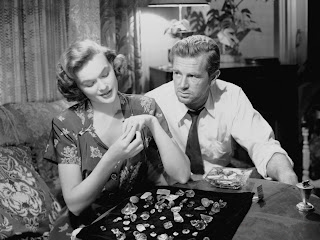

 Michelle Williams and Jake Gyllenhaal attending the premiere of "My Week With Marilyn" at New York Film Festival on 9th October, 2011
Michelle Williams and Jake Gyllenhaal attending the premiere of "My Week With Marilyn" at New York Film Festival on 9th October, 2011"My Week with Marilyn" (2011) Theatrical Trailer starring Michelle Williams and Eddie Redmayne
 Set in England in 1956, My Week with Marilyn chronicles the true story of Colin Clark, an assistant to the director and star of The Prince and the Showgirl, Sir Laurence Olivier, and third Assistant Director on the set of the film. The film is based upon his experiences with the cast and crew on set, but namely the one glorious week he spent alone with Marilyn Monroe who, at the time, had just recently married playwright Arthur Miller.
Set in England in 1956, My Week with Marilyn chronicles the true story of Colin Clark, an assistant to the director and star of The Prince and the Showgirl, Sir Laurence Olivier, and third Assistant Director on the set of the film. The film is based upon his experiences with the cast and crew on set, but namely the one glorious week he spent alone with Marilyn Monroe who, at the time, had just recently married playwright Arthur Miller. Hollywood, Marilyn Monroe, Sir Laurence Olivier and a true story, this movie was screaming Oscar potential before it even had a cast selected. I wouldn’t be surprised if this gets nominated for best picture but it is Michelle Williams and Kenneth Branah’s performances that will garner surefire nominations for their spot on portrayals of the Hollywood legends. Both of them were rightfully emotional, wonderfully clever and spot on with their comedic timing. The best parts of the film usually involved the constant struggle between Olivier and Marilyn due to their very different acting styles and level of experience.
Hollywood, Marilyn Monroe, Sir Laurence Olivier and a true story, this movie was screaming Oscar potential before it even had a cast selected. I wouldn’t be surprised if this gets nominated for best picture but it is Michelle Williams and Kenneth Branah’s performances that will garner surefire nominations for their spot on portrayals of the Hollywood legends. Both of them were rightfully emotional, wonderfully clever and spot on with their comedic timing. The best parts of the film usually involved the constant struggle between Olivier and Marilyn due to their very different acting styles and level of experience. Since we see everything through the eyes of Colin Clark, played with a charismatic fragility by Eddie Redmayne, we are able to understand how complex Marilyn’s life was and how, because of his desire to protect her and tell her the truth, we are able to see the real distraught and insecure person she was, the girl who grew up in other peoples’ homes and is now constantly under the looking glass.
Since we see everything through the eyes of Colin Clark, played with a charismatic fragility by Eddie Redmayne, we are able to understand how complex Marilyn’s life was and how, because of his desire to protect her and tell her the truth, we are able to see the real distraught and insecure person she was, the girl who grew up in other peoples’ homes and is now constantly under the looking glass. It is this new found insight, for me at least, that makes this film so special and how we are able to learn about the various layers to her personality and overall persona. It may not offer anything new to those that are familiar with Monroe, but Williams was able to portray her lack of confidence and torn personality with ease, especially when we see her relationship with Colin blossom.
It is this new found insight, for me at least, that makes this film so special and how we are able to learn about the various layers to her personality and overall persona. It may not offer anything new to those that are familiar with Monroe, but Williams was able to portray her lack of confidence and torn personality with ease, especially when we see her relationship with Colin blossom. It was shot in the same locations that The Prince and the Showgirl used back in the 60s and even identically mimicked scenes from the film which allowed Williams to not only sing like Marilyn, but also act like her when on a set. You could see Williams playing a role within a role within a role which was quite fascinating to experience. Source: moviebuzzers.com
It was shot in the same locations that The Prince and the Showgirl used back in the 60s and even identically mimicked scenes from the film which allowed Williams to not only sing like Marilyn, but also act like her when on a set. You could see Williams playing a role within a role within a role which was quite fascinating to experience. Source: moviebuzzers.com "Michelle Williams is so good as the title character in Simon Curtis‘ My Week with Marilyn that watching the film is like watching Some Like it Hot for the first time — or whichever film it was that made you fall in love with Marilyn Monroe at first sight. It’s like falling in love with the icon all over again, and at the end, you have to remind yourself that you were watching somebody else. It would be superb if this film — an absolute crowd-pleaser — makes a commercial splash, because Williams, so often appearing brilliantly in little-seen projects (Wendy and Lucy, Blue Valentine, Meek’s Cutoff), deserves a much bigger audience.
"Michelle Williams is so good as the title character in Simon Curtis‘ My Week with Marilyn that watching the film is like watching Some Like it Hot for the first time — or whichever film it was that made you fall in love with Marilyn Monroe at first sight. It’s like falling in love with the icon all over again, and at the end, you have to remind yourself that you were watching somebody else. It would be superb if this film — an absolute crowd-pleaser — makes a commercial splash, because Williams, so often appearing brilliantly in little-seen projects (Wendy and Lucy, Blue Valentine, Meek’s Cutoff), deserves a much bigger audience. The film could have been a wreck without the correct Marilyn, and I’m not sure Williams could have done anything more with the role. After a string of unflattering indie dramas, she somehow manages to exude the quintessential appeal of one of the medium’s most decorated icons. And the film finds its engine through that coaxing characterization". Source: thefilmstage.com
The film could have been a wreck without the correct Marilyn, and I’m not sure Williams could have done anything more with the role. After a string of unflattering indie dramas, she somehow manages to exude the quintessential appeal of one of the medium’s most decorated icons. And the film finds its engine through that coaxing characterization". Source: thefilmstage.com Marilyn Monroe on the set of "Niagara" (1953) directed by Henry Hathaway
Marilyn Monroe on the set of "Niagara" (1953) directed by Henry Hathaway Marilyn Monrose plays Rose Loomis in "Niagara"
Marilyn Monrose plays Rose Loomis in "Niagara"Hathaway's Techni-colored noir provided the perfect star vehicle for curvy sexpot Marilyn Monroe, who was compared to the famous falls in one of the film's taglines: "A raging torrent of emotion that even nature can't control!"
 At a cabin near the famed vacation spot, tension quickly developed between unstable, shell-shocked WWII veteran George Loomis (Joseph Cotten), married to a beautiful and voluptuous younger blonde named Rose (Marilyn Monroe). She was a sinfully-wayward, unhappily married woman and trashy femme fatale.
At a cabin near the famed vacation spot, tension quickly developed between unstable, shell-shocked WWII veteran George Loomis (Joseph Cotten), married to a beautiful and voluptuous younger blonde named Rose (Marilyn Monroe). She was a sinfully-wayward, unhappily married woman and trashy femme fatale. Rose ignited the screen when she sang the song "Kiss" in a tight-fitting, low-cut pinkish-red dress. She was cheating on her husband and plotting his death with secret young lover Ted Patrick (Richard Allan) to collect on George's life insurance policy.
Rose ignited the screen when she sang the song "Kiss" in a tight-fitting, low-cut pinkish-red dress. She was cheating on her husband and plotting his death with secret young lover Ted Patrick (Richard Allan) to collect on George's life insurance policy. "Marilyn Monroe's First Dramatic Role: Still pining for a dramatic role she could sink her teeth into, Marilyn got the opportunity she had been waiting for with the drama Don't Bother to Knock, which was released a few months before Monkey Business but made at roughly the same time.
"Marilyn Monroe's First Dramatic Role: Still pining for a dramatic role she could sink her teeth into, Marilyn got the opportunity she had been waiting for with the drama Don't Bother to Knock, which was released a few months before Monkey Business but made at roughly the same time. Cast in the starring role as Nell, a psychotic babysitter who threatens to harm the innocent little girl left in her charge, Marilyn attempted to make use of her training and hard work to deliver a good performance -- and perhaps deliver herself from a succession of "dumb blonde" characters.
Cast in the starring role as Nell, a psychotic babysitter who threatens to harm the innocent little girl left in her charge, Marilyn attempted to make use of her training and hard work to deliver a good performance -- and perhaps deliver herself from a succession of "dumb blonde" characters. Richard Widmark costarred as a stranger whom Nell mistakes for her dead lover. Nell's confusion over past and present events pushes her over the edge and becomes the catalyst for her actions against the child.
Richard Widmark costarred as a stranger whom Nell mistakes for her dead lover. Nell's confusion over past and present events pushes her over the edge and becomes the catalyst for her actions against the child. Unfortunately, neither the scriptwriter nor the director provided Marilyn with much to work with in terms of understanding and developing the character of Nell. The script offered only the vaguest suggestion for the causes of Nell's mental imbalance and provided no credible account of the weaknesses in her personality that might have led to insanity. Roy Ward Baker, a competent but not outstanding director, offered Marilyn no key with which she might have unlocked the mysteries behind Nell. According to some of her later directors, Marilyn often needed that sort of insight in order to come to grips with her characters' motivations, and to play a role convincingly. She received no help of that kind during the shooting of Don't Bother to Knock.
Unfortunately, neither the scriptwriter nor the director provided Marilyn with much to work with in terms of understanding and developing the character of Nell. The script offered only the vaguest suggestion for the causes of Nell's mental imbalance and provided no credible account of the weaknesses in her personality that might have led to insanity. Roy Ward Baker, a competent but not outstanding director, offered Marilyn no key with which she might have unlocked the mysteries behind Nell. According to some of her later directors, Marilyn often needed that sort of insight in order to come to grips with her characters' motivations, and to play a role convincingly. She received no help of that kind during the shooting of Don't Bother to Knock. Consequently, most of the reviews of her performance were brutal. Bosley Crowther of The New York Times, who had recognized Marilyn's potential in earlier films, summed up the tone of many reviews when he wrote, "All the equipment that Miss Monroe has to handle the job are a childishly blank expression and a provokingly feeble, hollow voice."
Consequently, most of the reviews of her performance were brutal. Bosley Crowther of The New York Times, who had recognized Marilyn's potential in earlier films, summed up the tone of many reviews when he wrote, "All the equipment that Miss Monroe has to handle the job are a childishly blank expression and a provokingly feeble, hollow voice." Richard Widmark and Marilyn Monroe play Jed Towers and Nell Forbes in "Don't bother to knock" (1952)
Richard Widmark and Marilyn Monroe play Jed Towers and Nell Forbes in "Don't bother to knock" (1952)Dispelling these negative perceptions of Marilyn's performance in the film is this testimony to her skills by costar Anne Bancroft: "It was a remarkable experience. Because it was one of those very few times in all my experiences in Hollywood when I felt that give and take that can only happen when you are working with good actors. There was just this scene of one woman seeing another woman who was helpless and in pain, and [Marilyn] was helpless and in pain. It was so real, I responded. I really reacted to her. She moved me so that tears came into my eyes."
 Don't Bother to Knock does have its share of melodrama, as in this scene, in which the babysitter threatens to brain her well-meaning uncle, played by Elisha Cook, Jr.
Don't Bother to Knock does have its share of melodrama, as in this scene, in which the babysitter threatens to brain her well-meaning uncle, played by Elisha Cook, Jr. In addition to her dramatic role in Don't Bother to Knock, Marilyn starred in the "Statement in Full" episode of the NBC radio program Hollywood Star Playhouse in August 1952. She was cast as a scheming murderess, a character that foreshadowed her role as Rose Loomis in Niagara -- the film that would finally allow her to fulfill her hard-fought goal of being a genuine movie star". Source: entertainment.howstuffworks.com
In addition to her dramatic role in Don't Bother to Knock, Marilyn starred in the "Statement in Full" episode of the NBC radio program Hollywood Star Playhouse in August 1952. She was cast as a scheming murderess, a character that foreshadowed her role as Rose Loomis in Niagara -- the film that would finally allow her to fulfill her hard-fought goal of being a genuine movie star". Source: entertainment.howstuffworks.com Marilyn Monroe played the girlfriend of a crooked lawyer in The Asphalt Jungle (1950) directed by John Huston
Marilyn Monroe played the girlfriend of a crooked lawyer in The Asphalt Jungle (1950) directed by John Huston"In the Asphalt Jungle, crime is as routine as an eight-hour swing shift on the packing line. Huston directs the proceedings with business-as-usual detachment, eschewing sensationalism at every turn.
 Jean Hagen as Doll Conovan and Sterling Hayden as Dix Handley in "The Asphalt Jungle" (1950)
Jean Hagen as Doll Conovan and Sterling Hayden as Dix Handley in "The Asphalt Jungle" (1950)Emmerich, the slilppery solicitor, comes into the deal as the fence who will move the stolen gems. But he's far from the solvent sophisticate he purports to be. He's blown his savings on his sexy "niece" Angela (Marilyn Monroe), who allows "Uncle Lon" to reclaim some of his faded youth. When Emmerich can't call in a single marker to pay for the jewels, he's forced to concoct a swindle. "It's my whole way of life", he admits sadly.
 "Why are you staring at me like that, Uncle Lon?" -Angela Phinlay (Marilyn Monroe) is a catalyst for robbery in "The Asphalt Jungle"
"Why are you staring at me like that, Uncle Lon?" -Angela Phinlay (Marilyn Monroe) is a catalyst for robbery in "The Asphalt Jungle" Richard Widmark always cited "Panic in the streets" (1950) as his personal favorite among his many films.
Richard Widmark always cited "Panic in the streets" (1950) as his personal favorite among his many films.











































